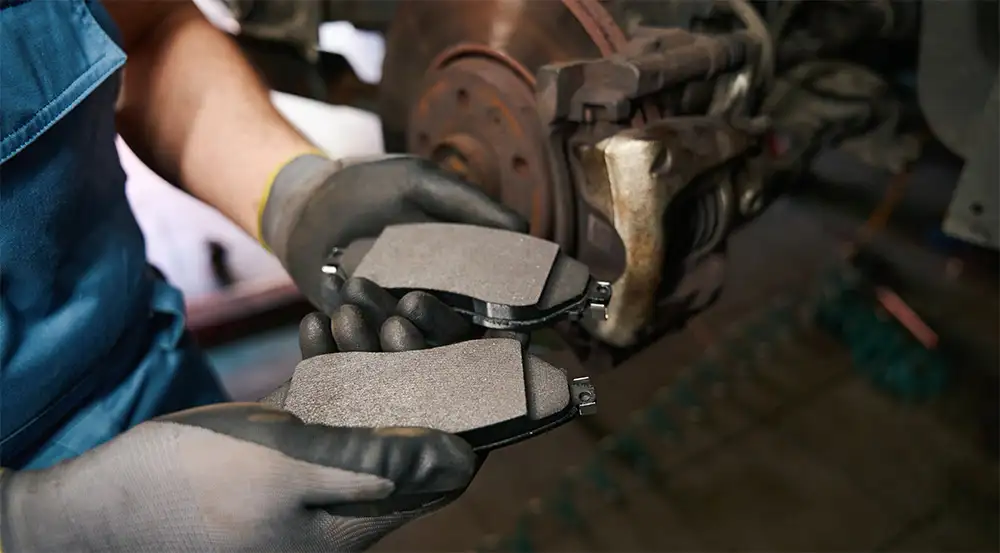When it comes to vehicle safety, few components are as vital as your brakes. One key part of the braking system that requires regular attention is the brake pads. Knowing when to replace your brake pads can be the difference between safe driving and dangerous situations. In this comprehensive guide, we’ll explore how often brake pads need to be replaced and the factors that affect their lifespan.
What Are Brake Pads and Why Are They Important?
Brake pads are part of the braking system that makes contact with the rotors to create the friction needed to slow down or stop your vehicle. Over time, the material on the pads wears down from constant friction, which can lead to less effective braking and eventually, a dangerous situation if not addressed.
How Long Do Brake Pads Typically Last?
On average, brake pads last between 25,000 to 65,000 miles, but this can vary greatly depending on several factors. Some vehicles might see brake pad wear as early as 20,000 miles, while others may not need new brake pads until after 70,000 miles.
Virginia State Inspection and Brake Pads
As part of the annual Virginia State Vehicle Inspection, brake pads are thoroughly checked. The state requires that brake pads meet specific thickness and performance standards. If your brake pads are worn beyond these limits, your vehicle will fail the inspection, and you’ll need to replace the pads before receiving a passing sticker.
Factors That Affect Brake Pad Wear and Tear
1. Driving Habits
The way you drive plays a significant role in how quickly your brake pads wear out. If you often brake hard, especially at high speeds, your brake pads will wear down faster. Drivers who are heavy on the brakes in city traffic or during frequent stop-and-go conditions will experience faster wear than those who do a lot of highway driving where braking is less frequent.
The way you drive plays a significant role in how quickly your pads wear out. If you often brake hard, especially at high speeds, your pads will wear down faster. Drivers who are heavy on the brakes in city traffic or during frequent stop-and-go conditions will experience faster wear than those who do a lot of highway driving where braking is less frequent.
2. Type of Brake Pads
Not all brake pads are created equal. There are several types of brake pads, and each has different durability and performance characteristics:
- Organic brake pads: Made from materials like rubber, glass, and Kevlar, these pads are softer and tend to wear out faster.
- Semi-metallic brake pads: A blend of metal shavings, these are more durable and offer better performance but can be noisier.
- Ceramic brake pads: Known for their longevity and quiet performance, ceramic pads are the most expensive but offer excellent wear resistance.
The material your brake pads are made of can have a big impact on their lifespan.
3. Driving Conditions
Driving in hilly or mountainous regions where you frequently brake on downhill slopes can wear your brake pads faster. Similarly, urban driving, which involves frequent stops, red lights, and traffic, will shorten brake pad life. Highway driving, on the other hand, tends to be gentler on your brakes since there’s less need for frequent stops.
4. Vehicle Type
The size and weight of your vehicle can also affect brake pad wear. Larger, heavier vehicles (like SUVs and trucks) put more stress on the brakes, which can cause the pads to wear out faster compared to smaller, lighter cars.
5. Brake Quality and Maintenance
Regular maintenance, including checking and cleaning your brakes, can extend the lifespan of your brake pads. Additionally, opting for high-quality brake pads from a reputable brand can result in longer-lasting performance compared to cheaper alternatives.
How to Tell If Your Brake Pads Need Replacing
Here are some warning signs that your brake pads may need to be replaced:
- Squealing or Screeching Noise: This high-pitched noise is caused by a built-in wear indicator on the brake pad and is designed to alert you that the pads are worn down and need to be replaced.
- Grinding Sound: If you hear a grinding noise when braking, it likely means the brake pads are completely worn out and the metal of the caliper is rubbing against the rotor. This can cause significant damage to the rotor, requiring more expensive repairs.
- Reduced Brake Responsiveness: If you notice it’s taking longer for your car to stop or you have to press the brake pedal harder than usual, your brake pads might be too thin or completely worn out.
- Brake Pad Thickness: If you can visually inspect your brake pads, check their thickness. If the pad material is less than ¼ inch thick, it’s time to replace them.
- Vibration When Braking: If your car vibrates or pulsates when you apply the brakes, it could be due to uneven brake pad wear or issues with the rotors.
How Often Should You Replace Your Brake Pads?
While brake pad lifespan varies based on the factors discussed above, a good rule of thumb is to inspect your brake pads every 15,000 to 20,000 miles and plan to replace them every 25,000 to 65,000 miles. Keep an eye on the warning signs and don’t wait for your brake pads to fail before getting them replaced.
Regular brake inspections during routine vehicle maintenance can catch worn pads before they become a bigger problem. This not only ensures your safety but also helps prevent damage to other brake components, such as rotors and calipers.
Professional Brake Repair with Mission Auto Repair
If you’ve noticed any of the warning signs or it’s time for a routine brake check, it’s best to consult a professional mechanic. Brake issues should never be ignored, as they can compromise your safety and lead to more costly repairs down the road.
At Mission Auto Repair, we specialize in brake repair and replacement, ensuring your vehicle’s braking system is in top shape. Whether you need new brake pads, rotors, or a full brake inspection, our experienced technicians are here to help.
Don’t wait until it’s too late—contact Mission Auto Repair today to schedule your brake service and keep your vehicle running safely and smoothly.
FAQ
1. How do I know when to replace my brake pads?
Look out for warning signs like squealing, grinding noises, reduced brake responsiveness, or a brake warning light. If your brake pads are less than ¼ inch thick, it’s time for a replacement.
2. Can I replace brake pads myself?
If you have automotive experience, you may be able to replace brake pads on your own. However, it’s important to ensure the job is done correctly for safety reasons. If you’re unsure, it’s best to leave it to a professional mechanic.
3. How long do brake pads usually last?
Brake pads generally last between 25,000 to 65,000 miles, depending on your driving habits, the type of brake pads, and other factors like driving conditions.
4. What happens if I don’t replace worn brake pads?
If you don’t replace worn brake pads, they can wear down completely, causing the metal of the calipers to grind against the rotors. This can lead to more expensive repairs and unsafe driving conditions.
5. Do I need to replace my rotors when I replace my brake pads?
Not always. However, if your rotors are worn, warped, or damaged, it may be necessary to replace or resurface them when replacing brake pads. Your mechanic can inspect them during the service.
Taking care of your brake system is crucial for your safety. Regular inspections and timely replacements will ensure that your vehicle’s brakes perform at their best. Let Mission Auto Repair help you keep your brakes in top condition—contact us today for expert brake repair and maintenance services.


